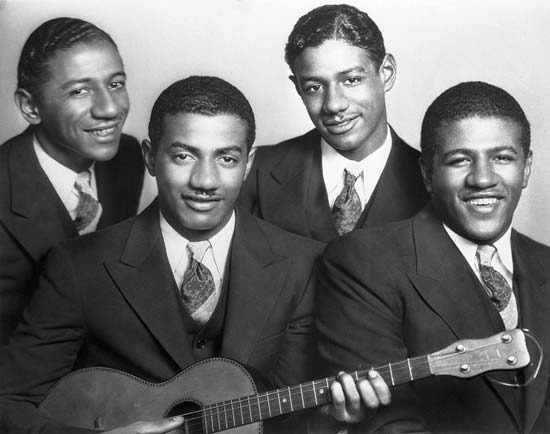By: Gabrielle Brim
After the American Civil War, institutions were established by Freedman’s Bureau and the American Missionary Association to help educate the emancipated slaves. Due to financial problems, these institutions formed musical groups to help fund their colleges and mission. Fisk University was the first to do so, and created a jubilee quartet as well. In addition to Fisk, Hampton Institute, Southern University, Morehouse College, and Tuskegee Institute were some of the other notable universities who established jubilee quartets to help fund their schools. In addition, community quartets were present in African American neighborhoods. Both of these early styled quartets contained characteristics such as a minimum of four voices that contained a 1st and 2nd tenor, baritone, and bass; well-blended harmonies, short and long call and response phrases that overlapped, polyrhythms, etc. University-style quartets were more lyrical than community style quartets. However, community style quartets were more culturally defined, containing blues and grace notes within songs.
Quartets usually sung folk, upbeat jubilee songs, and harmonized spirituals. Some quartets, specifically community and barbershop quartets, also sung popular songs. Most quartets sung about biblical stories or secular topics. Within the songs, the bass singer had vocal interjections that occurred while the group rests. Some quartets also had a falsetto lead.
During the period between 1930 and 1945, early university and community jubilee quartets began to transition to gospel and performance style. This change in style increased the importance of bass and solo voices. In addition, minimal instrumentation, patriotic songs, show tones, and jazz pieces began to emerge. Additionally, quartets expanded to five members , creating double leads that alternated verses and phrases. The bass singer provided the foundational rhythm of the song, and also became the second soloist.
Also during this period, quartet contests were established, in which quartets competed against one another for audience admiration and trophies. People who sponsored these contests made profits off the quartets and the admissions for the contests.
During the period between 1946 and 1969, men and women quartets began to have radio broadcasts and commercial recordings that allowed community quartets to become more developed and popular. During this period, World War II negatively affected the production of automobiles and rubber for tires. As a result, the ability tour was hindered. Contrarily, radio broadcast allowed quartet music to travel to other areas and become popular. The Wheat Street Female Quartet was the first female quartet documented and recorded in Atlanta in 1925. Other notable quartet groups during this time include the Golden Gate Quartet and the Five Blind Boys of Alabama and Mississippi.
Within the second half of the twentieth century, jubilee quartets began to evolve into a form of gospel music. Due to the incorporation of dramatic deliveries and personal testimonies, jubilee quartets began to model a style that was very common to gospel music. As a result, it can be implied that jubilee quartets influenced gospel music. Both genres had elements such as call and response, double lead, polyrhythms, and melismas. Most importantly they shared similar biblical-based lyrics.
Jubilee quartets have a unique sound that cannot be duplicated. The intertwining of melodic and blues notes creates a smooth sound that is soothing to the listener. In addition, the upbeat sound provides a catchy feel to the music. Despite its uniqueness, artists, such as Elvis Presley, attempted to copy the style of the quartets. However, due to his lack of authenticity, Presley was of no comparison to the Jubilee quartets. In my opinion, Presley’s sound lacked originality and creativity, and sounded like a mere imitation. The sound of a soloist trying to sing a piece meant for a quartet simply does not have the same effect or captivating feel as do multiple singers who sing different parts.
[embedyt] https://www.youtube.com/watch?v=Qf73zvvxLlc[/embedyt]


